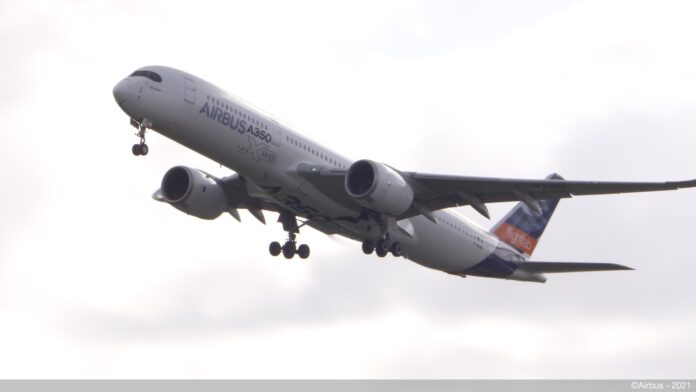A team of aerospace specialists has launched the world’s first in-flight emissions study using 100% sustainable aviation fuel (SAF) on a wide-body commercial passenger aircraft.
Airbus, German research centre DLR, Rolls-Royce, SAF producer Neste and The University of Manchester, have teamed up to start the pioneering ‘Emission and Climate Impact of Alternative Fuels’ (ECLIF3) project looking into the effects of 100% SAF on aircraft emissions and performance.
Findings from the study – to be carried out on the ground and in the air using an Airbus A350-900 aircraft powered by Rolls-Royce Trent XWB engines – will support efforts currently underway at Airbus and Rolls-Royce to ensure the aviation sector is ready for the large-scale use of SAF as part of the wider initiative to decarbonise the industry.
Fuel-clearance engine tests, including a first flight to check operational compatibility of using 100% SAF with the aircraft’s systems, started at Airbus’ facilities in Toulouse, France, this week. These will be followed by the ground-breaking flight-emissions tests due to start in April and resuming in the Autumn, using DLR’s Falcon 20-E ‘chase plane’ to carry out measurements to investigate the emissions impact of using SAF. Meanwhile, further ground tests measuring particulate-matter emissions are set to indicate the environmental impact of SAF-use on airport operations.
The University of Manchester has been heavily involved in the development of the newly introduced regulations of non-volatile Particulate Matter (nvPM) from aircraft engines and has vast experience in measuring the currently unregulated volatile particulate emissions. Whilst the main focus of the work will be to determine the impacts of SAF on the regulated nvPM, the University will look to measure and understand the impacts of SAF on the volatile fraction. This is a key area of research as aviation regulators are examining whether the volatile PM should be subject to regulation.
Dr Paul Williams, Senior Research Fellow, The University in Manchester is working on the ground-based emissions study as part of the project: “This is an exciting opportunity to get a glimpse of the future emissions from aviation. SAF is going to be an important component of the aviator sector in the future, and being involved in ECLIF3 allows the University to assess the impacts, and hopefully the benefits.” he said.







